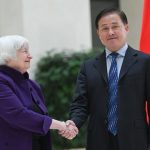With this comment, he suggested he is comfortable with current interest rate level, which is what the stock market is looking for. The Dow Jones industrial average climbed more than 87 points, or 0.7 percent, to a record of 12,741.86, and the broader S&P500 rose 0.8 percent to hit 1,455.30, its highest point in more than six years.
 “Inflation pressures appear to have abated somewhat … A waning of the temporary factors that boosted inflation in recent years will probably help foster a continued edging down of core inflation” Ben said.
“Inflation pressures appear to have abated somewhat … A waning of the temporary factors that boosted inflation in recent years will probably help foster a continued edging down of core inflation” Ben said.
Fed forecasts that the economy will expand by 2.5 to 3 percent this year, 2007; that unemployment will remain low at about 4.75 percent, which is near what many economists consider full employment; and for core inflation, excluding energy and food prices, to hover just above 2 percent.
Mr. Bernanke said that last year’s slowdown in housing might have stabilized, adding that the weakness in housing had not spilled over to other parts of the economy. However he cautioned that the biggest risk to economic growth was that the housing market would continue to plunge, dragging down consumer spending and investment. Another risk is that energy prices, which have declined sharply in recent months, might climb rapidly again and begin to affect consumer prices in general.
This good news is definitely a factor which will contribute to the bullish stock-market in other region including Asia. Already you can see Singapore and Malaysia stock market have registered new highs over the time. And with the central bank to follow suit by leaving the interest rate unchanged, the businessman can be relieve that their profit will not goes into paying borrowing’s interest.

|
|
February 15th, 2007 by financetwitter
|


|

|

|

|

|

|




























Comments
Add your comment now.
Leave a Reply